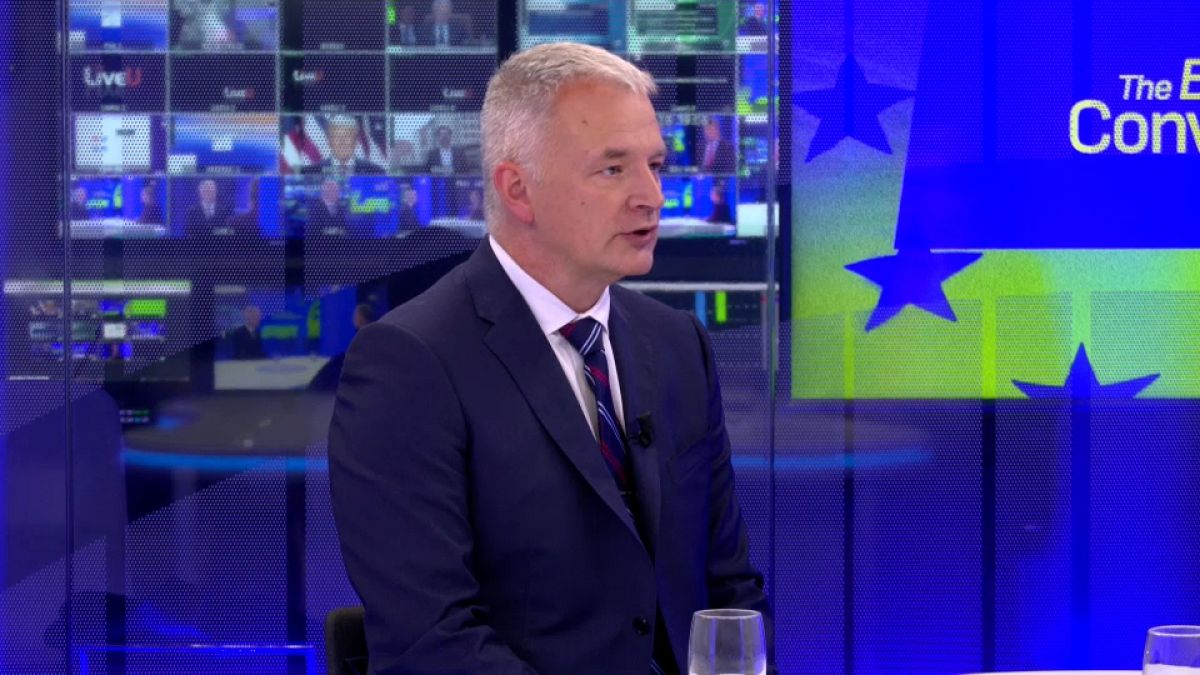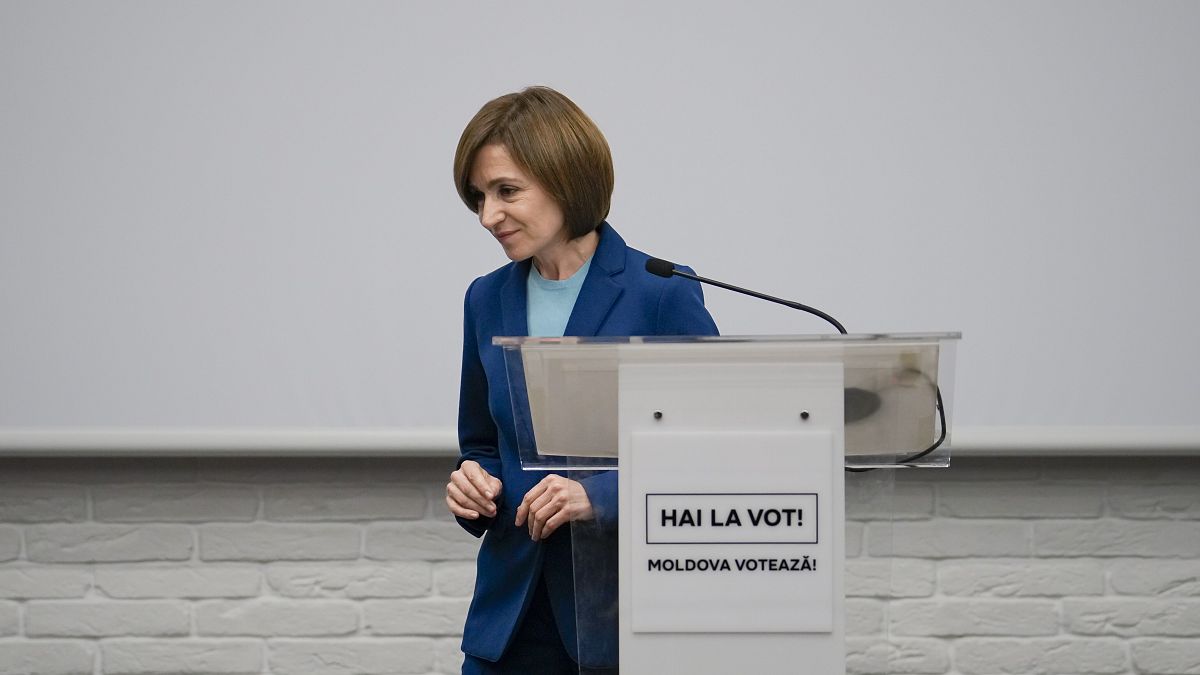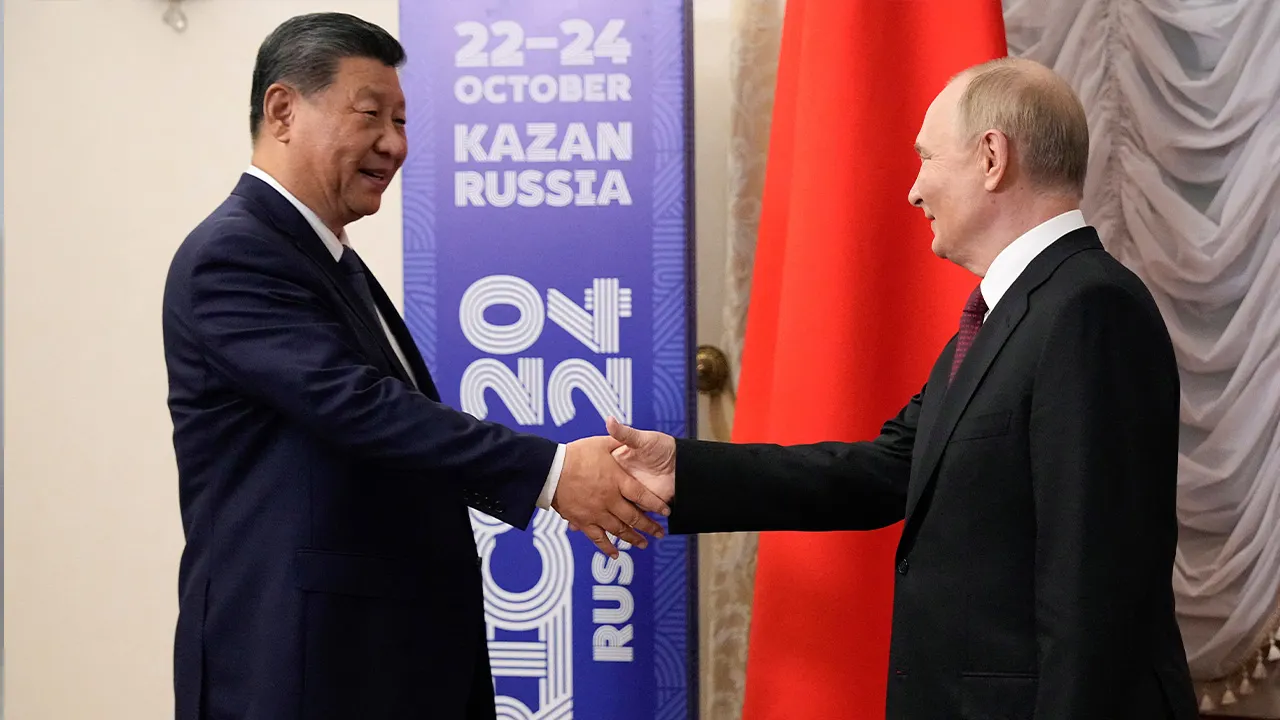World
Von der Leyen sets out five principles for Gaza’s post-war future
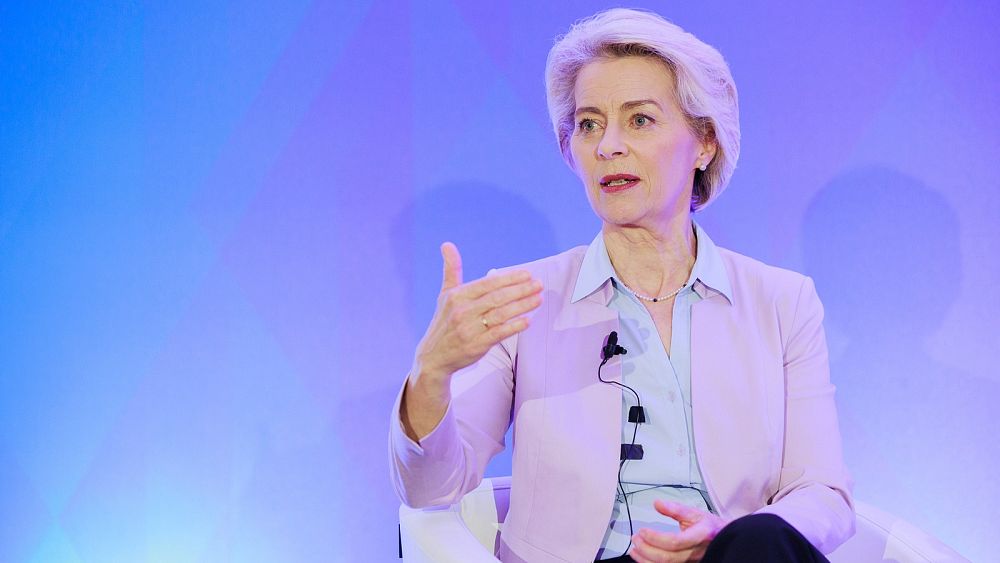
Ursula von der Leyen has proposed five “basic principles” to guide the future of the Gaza Strip once the Israel-Hamas war comes to an end.
The principles, which are anchored in the perspective of a two-state solution, include the end of Hamas rule over the densely populated enclave and the lifting of the strict blockade imposed by Israel and Egypt since 2007.
The European Union and the United States consider Hamas a terrorist organisation and have no formal contact with the group.
“Hamas has continued to build up its arsenal, while the economy of Gaza has collapsed, so it’s just the opposite of what we wanted. 70% of young people in Gaza are jobless. And this can only lead to more radicalisation,” the president of the European Commission said on Monday morning during the annual conference of EU Ambassadors in Brussels.
“Any future Palestinian State must be viable, also from an economic point of view.”
The five principles for Gaza proposed by von der Leyen are:
- No safe haven for terrorists.
- No Hamas-led government.
- No long-term Israeli security presence.
- No forced displacement of Palestinians.
- No sustained blockade.
“All of this may look overly ambitious, as the war still rages on,” von der Leyen admitted. “But we must spare no effort to keep the hope alive. To find a lasting solution, based on two states, living side by side in peace and security.”
Von der Leyen’s comments come as fighting intensifies in the region.
Israel has vowed to “demolish” Hamas after the militant group launched a series of unprecedented attacks in Israel on 7 October in which more than 1,400 people were killed.
Since then, the Israeli Defence Forces have pounded the Gaza Strip with heavy bombardment, causing a severe humanitarian crisis. According to the Hamas-run Health Ministry of Gaza, over 9,700 have been killed, including 4,800 children.
The European Union has adopted a joint position supporting Israel’s right to self-defence “in line with international law” and calling for “humanitarian corridors and pauses” to accelerate deliveries of emergency aid, such as food, water and fuel, into Gaza.
But the plea, also echoed by Washington, has failed to effect change on the ground and appears to ring hollow as the number of civilian casualties rises to new heights.
“The humanitarian situation is dire. The death toll and the suffering of Palestinian civilians is tragic,” von der Leyen said on Monday. “Our hearts bleed at the images of small children pulled out from under the rubble.”
“While Israel has the right to fight Hamas, it is also essential that it strives to avoid civilian casualties, and to be as targeted as possible,” she went on. “Because every human life matters, be it Israeli or Palestinian.”
The Commission chief announced a further €25 million in humanitarian aid for Gaza, bringing total funding for this year to €100 million, and said her executive was working on a “maritime corridor” from Cyprus to complement the Rafah crossing, the only route currently available to bring in emergency supplies.
The speech represents a new tone for von der Leyen, who was criticised in the first days of the conflict for adopting a position seen as overly one-sided in favour of Israel, and reflects the growing concern in Brussels over the mounting death toll in the region.
“The size and scale of today’s events require that we act and think strategically. Even and especially when the fog of war is thick, and emotions run high,” von der Leyen told ambassadors, referring to the conflicts in Ukraine, the Caucasus and the Sahel.
Borrell’s stark warning
Josep Borrell, the EU’s foreign policy chief, was also present at the event and used the opening address to share his frank reflections about the Israel-Hamas war, which he described as “the outcome of a collective political and moral failure” dating back to the never-realised 1993 Oslo Accords.
“This is the last chance for the two-state solution. If we don’t succeed, we will be definitely in a spiral of violence and mutual hate for generations,” Borrell said.
In the diplomat’s view, the Israeli-Palestinian conflict should not be described as a “religious” or “ethnic” dispute but as a national problem of “two people who have an equivalent right to exist on the same land” and need to find an effective way to share it.
“There’s no military solution to the conflict. Without a political strategy, no one (can) win a battle against terrorism. You can crash people. But everywhere we have to look for political solutions,” he said. “Even if Hamas is uprooted in Gaza. This will not solve the problem of Gaza, not the let alone the West Bank problem. So overreactions are always understandable, but never effective.”
Borrell urged Israel “not to be blinded by rage” and cautioned that “ignoring the human costs could ultimately backfire” against the country.
The foreign policy chief then drew a parallel between the Israel-Hamas war and Russia’s invasion of Ukraine to warn that the bloc’s reaction to the former might dent its response to the latter and be perceived as a “contradiction” by the Global South.
“Both wars are different, completely different in their causes and consequences. But let’s be frank, the crisis in the Middle East is already having a lasting impact (on) our policy in Ukraine,” Borrell said.
“Our international support for Ukraine may erode in the light of what is being seen as the practice of double standards.”
In a direct appeal to the staff members in the audience, Borrell said EU ambassadors should “never make the mistake of framing global issues in terms of the West against the rest,” saying doing so would be “devastating” for the bloc’s image around the world.
“We are not the outpost of the Western world,” Borrell said. “This is the alpha and omega of my message: we are the keepers of global and shared values based on the United Nations charter. Everywhere. Every time.”

World
Sarah Palin, NY Times Have Explored Settlement, as Judge Sets Defamation Retrial
World
UN, Israel at odds over cause of decline in aid deliveries: 'False narratives by international community'
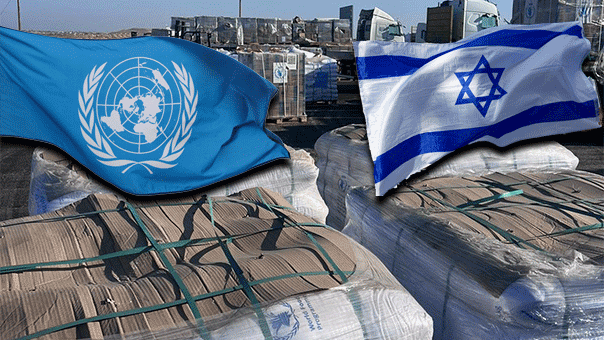
Aid entering Gaza declined during the month of October, particularly in the northern Gaza Strip where a military offensive against Hamas is underway. The United Nations and Israel are increasingly blaming one another over the reasons for and extent of the problem.
Stéphane Dujarric, spokesperson for U.N. Secretary-General António Guterres, stated on Oct. 27 that “repeated efforts to deliver humanitarian supplies” were being “denied by the Israeli authorities.”
Brig. Gen. Elad Goren, head of the Coordination of Government Activities in the Territories (COGAT) that oversees the humanitarian-civil effort in Gaza, told Fox News Digital that the accusation is “100 percent pure, complete lie.” Goren said that “there will be a time that people will write books about what has happened during this war. Not just in the battlefield, but also the fight over narratives, the false narratives by the international community.”
Goren emphasized the lack of “logistical capacity, lack of trucks, lack of manpower, lack of resources,” and overall lack of commitment in the U.N. effort. “If this is the most important humanitarian logistical operation,” Goren asked why the U.N. only brought 69 personnel and 40 trucks to distribute aid. “We feel that the U.N. does not want to be excellent in their job, because they believe that if they do their job, it will ease pressure on Israel,” Goren said.
BIDEN ADMIN ISSUES WARNING TO NETANYAHU AS ISRAEL HOLDS EMERGENCY MEETING ON GAZA AID
Israel opened up the Kisufim on Tuesday for the transfer of humanitarian aid trucks. The aid includes the delivery of food, water, medical supplies and shelter equipment to central and southern Gaza.
Seeming to reinforce Goren’s observation is data from COGAT showing that the number of aid trucks awaiting collection at the Kerem Shalom crossing rose from 450 on Oct. 1 to 700 on Oct. 30. COGAT shared exclusive footage of the overstocked Kerem Shalom loading area with Fox News Digital.
Goren said that COGAT “sat down with the U.N. several times in order to find solutions” to issues impeding aid deliveries, like looters continuing to attack humanitarian convoys. According to Goren, COGAT offered “alternative roads in order to bypass” looters, proposed “allowing the Palestinian trucks to move on defense roads from the Israeli side of the security fence,” and escorted trucks along their routes.
Dujarric refuted COGAT’s claims of offering alternative routes for trucks. He said that with pre-approved supplies only able to transit through three border crossings – Kerem Shalom, Gate 96 and Erez West – as of November, “our humanitarian colleagues…access these border areas by highly dangerous routes, exposed to hostilities, with many alternative roads being banned by the Israeli authorities. The routes available are often in poor condition and prone to armed looting resulting,” Dujarric continued. “Commercial supplies are virtually banned.”
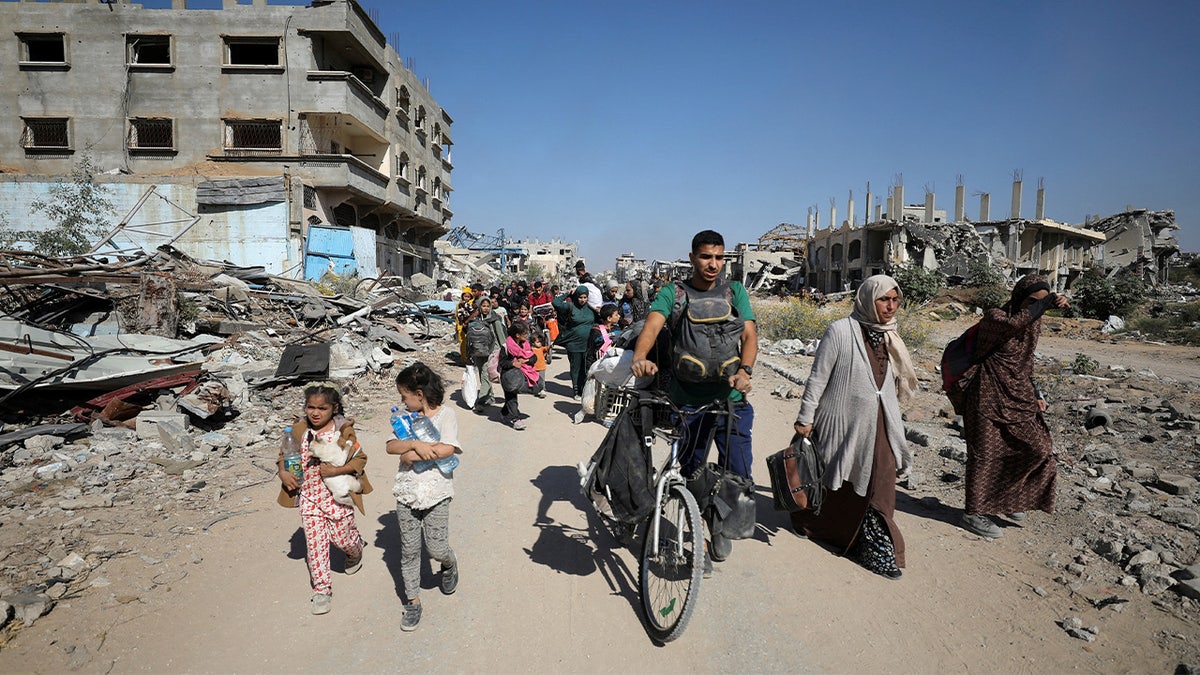
Displaced Palestinians ordered by the Israeli military to evacuate the northern part of Gaza flee amid an Israeli military operation in Jabalia in the northern Gaza Strip on Oct. 22, 2024. (REUTERS/Dawoud Abu Alkas)
In response to questions about aid backing up at Kerem Shalom, Dujarric said that “letting supplies be placed at barely accessible entry points cannot be considered as facilitating humanitarian efforts.” Only when “supplies and services have reached the people who need them, in sufficient quantities” are they considered facilitated, Dujarric added.
According to Dujarric, “there are 80 international staff, 13,000 national staff employed with UNRWA, and 208 national staff employed by other U.N. agencies,” who are “working in the most dangerous conditions to provide life-saving assistance for the over two million people of Gaza.” He said that “to accuse them, and their national colleagues, of lacking motivation is insulting to say the very least.”
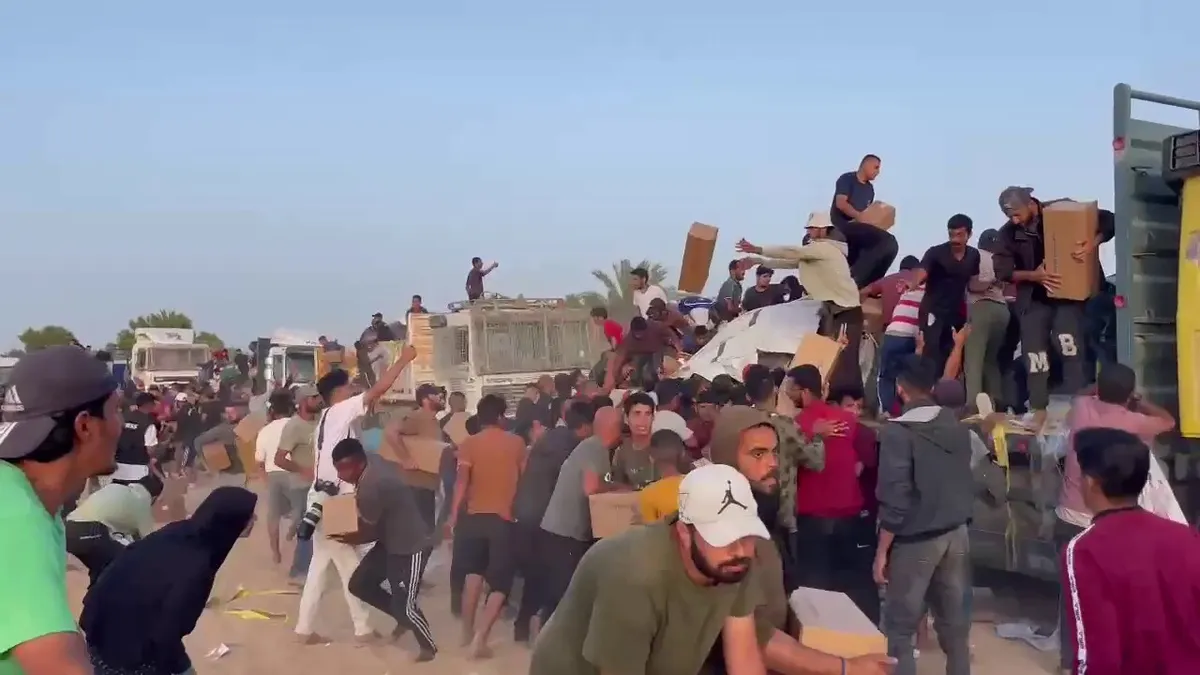
Looters take aid from trucks loaded with aid. (Majdi Fathi/TPS-IL)
Dujarric also noted additional concerns, including humanitarian workers being “held at Israeli checkpoints for hours, shot at, harassed and put in danger,” with one World Food Programme convoy “struck 10 times by IDF gunfire.” Dujarric said that only 35 of the 351 truck drivers WFP has submitted for clearance to COGAT were cleared.
ISRAELI PRIME MINISTER BENJAMIN NETANYAHU FIRES DEFENSE MINISTER YOAV GALLANT
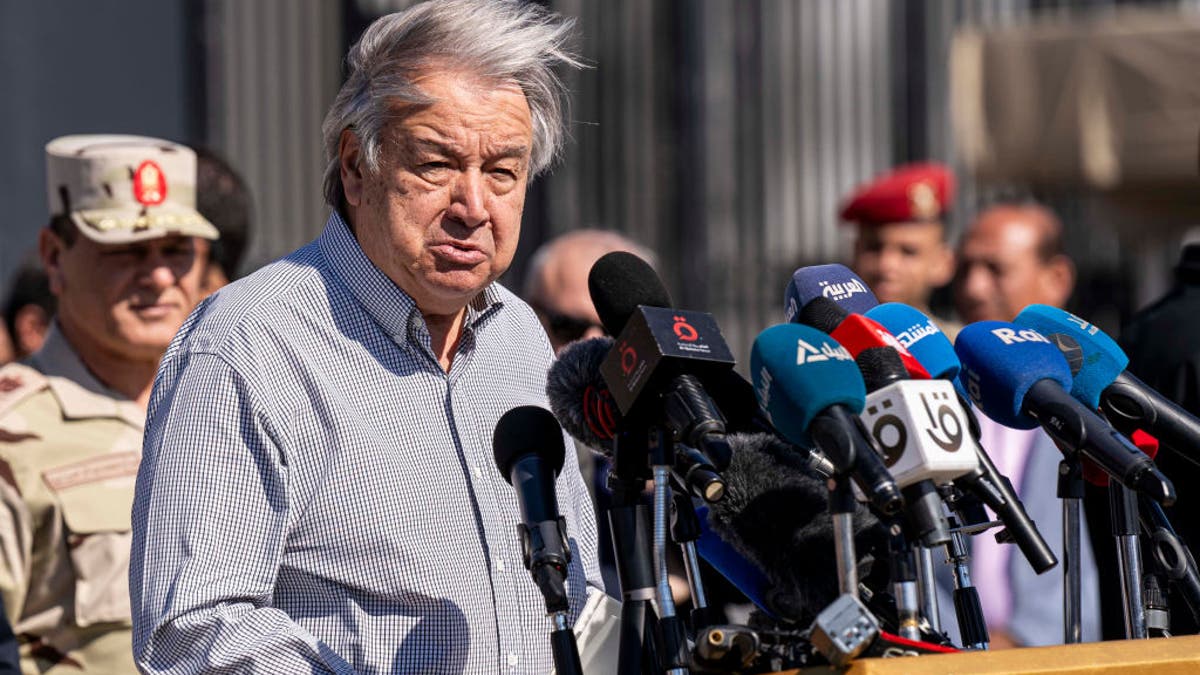
United Nations Secretary-General António Guterres speaks during a press conference in front of the Rafah border crossing on March 23, 2024 in Rafah, Egypt. (Photo by Ali Moustafa/Getty Images)
An Israel Defense Forces (IDF) spokesperson responded to Dujarric’s claims by telling Fox News Digital that the IDF “takes all operationally feasible measures to mitigate harm to civilians, including aid convoys and workers,” and “has never, and will never, deliberately target aid convoys and workers.” The spokesperson also explained that the IDF is “working proactively with international aid organizations to update driver lists, subject to strict security checks due to the drivers’ proximity to the Israeli border,” and wants to “expedite driver approvals.”
The IDF directly refuted Dujarric’s assertions about Kerem Shalom, saying that Israel “has taken proactive steps to improve accessibility at the crossings,” including carrying out road expansions, adding “dozens of empty trucks, forklifts, and additional logistical equipment,” and allowing “daily tactical pauses to enable and ease the transfer of aid.”
The IDF spokesperson said that Israel has been sending “humanitarian aid, blood supplies, food boxes, fuel, and medical equipment” and medical teams into northern Gaza through Erez and two additional locations. Israeli officials did announce last week that they will soon add a new humanitarian aid crossing in Kissufim in order to facilitate more deliveries to the southern portion of the Gaza Strip.

Israeli soldiers stand at the entrance to a tunnel leading to Egypt amid the ongoing conflict between Israel and the Palestinian Islamist group Hamas in the Gaza Strip in the Philadelphi Corridor area in southern Gaza on Sept. 13, 2024. (REUTERS/Amir Cohen)
On Nov. 1, Reuters alleged that the situation in northern Gaza was “apocalyptic,” with all Gazans “at imminent risk of dying from disease, famine and violence.” On Nov. 8, the Integrated Food Security Phase Classification (IPC) Famine Review Committee issued a similar warning, explaining that there was “a strong likelihood that famine is imminent” in parts of northern Gaza.
David Adesnik, a senior fellow and director of research at the Foundation for Defense of Democracies, has tracked dire warnings of famine in Gaza during the conflict there. He talked with Fox News Digital about prior predictions of doom which did not come to pass, largely because of COGAT’s efforts to allay hunger.
Adesnik explained that the IPC has “downplayed the good news aggressively” of the “long term trend” of lowering the number of Gazans in the worst phases of hunger. The IPC found in December 2023 that 17% of Gazans faced catastrophic phase-five hunger conditions. By March, 30% of the population had reached phase five, with onlookers predicting famine was imminent. The next report, however, found that just 15% of Gazans were in phase five. The most recent IPC snapshot from October shows that just 6% of Gazans are in phase five, though the IPC warns that this number is “expected to nearly triple in the coming months”. The IPC proclaimed that the “risk of famine persists.”
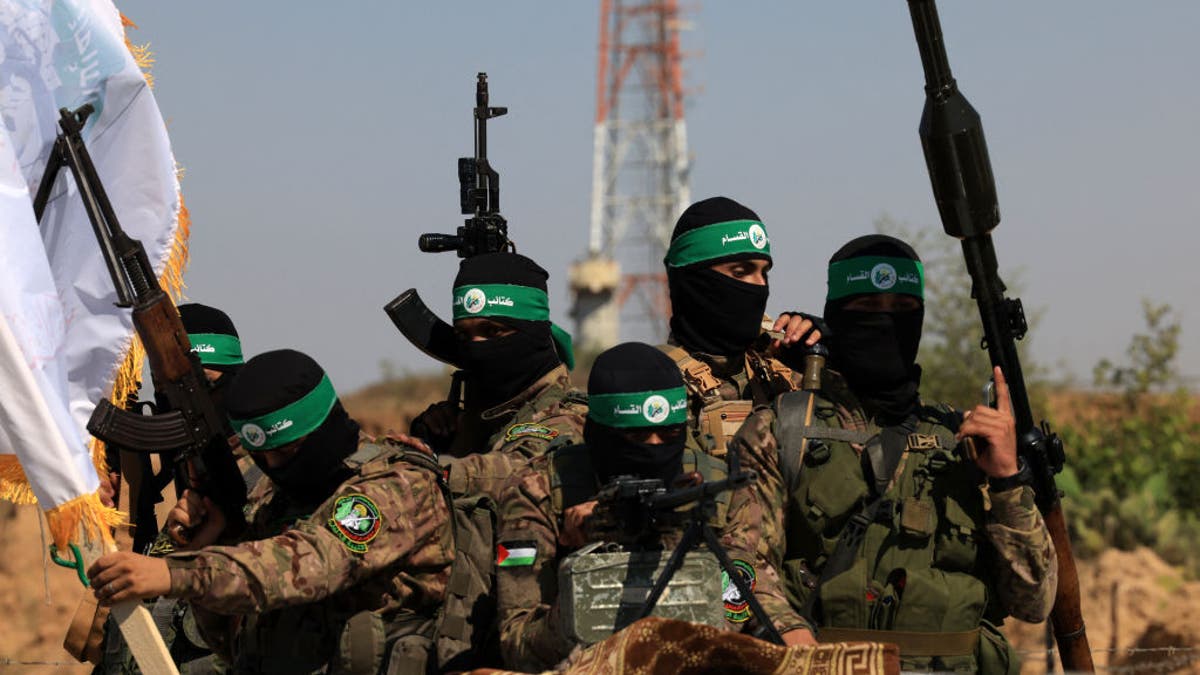
Palestinian terrorists of the al-Qassam Brigades, the armed wing of the Hamas movement, take part in a military parade to mark the anniversary of the 2014 war with Israel, near the border in the central Gaza Strip on July 19, 2023. (MAHMUD HAMS/AFP via Getty Images)
With a new U.N. FAO-WFP report that likewise raises alarms about possible famine, Adesnik said that “the U.N. is doing its best to obscure the improvements in food security made possible by a surge of aid into Gaza this past spring and summer.” He added that the report fails to mention how, according to U.N. data, there was an 80% decline in “the number of Gaza residents facing the most severe deprivation” between March and October.
ISRAELI FORCES SEIZE DOCUMENTS THAT REVEAL HAMAS PLAN FOR MORE ELABORATE ATTACKS: REPORT
Professor Aron Troen, of the Faculty of Agriculture, Food and Environment at Hebrew University in Jerusalem, performed an analysis of the quantity of calories reaching Gazan civilians through humanitarian aid efforts. In May, Troen’s report found that the “quantity and nutritional composition of the food that has been delivered over the past four months complied, and even exceeded” an “internationally-recognized benchmark for humanitarian response.”
Troen told Fox News Digital that his team recently updated its figures and found that aid entering Gaza was “enough up until September.” Troen added that COGAT is “doing a heroic job in very tough times” but that “there really is immense suffering in Gaza.”
COGAT’s online portal shows that since the war began in October, more than 1,115,000 tons of aid have entered Gaza.
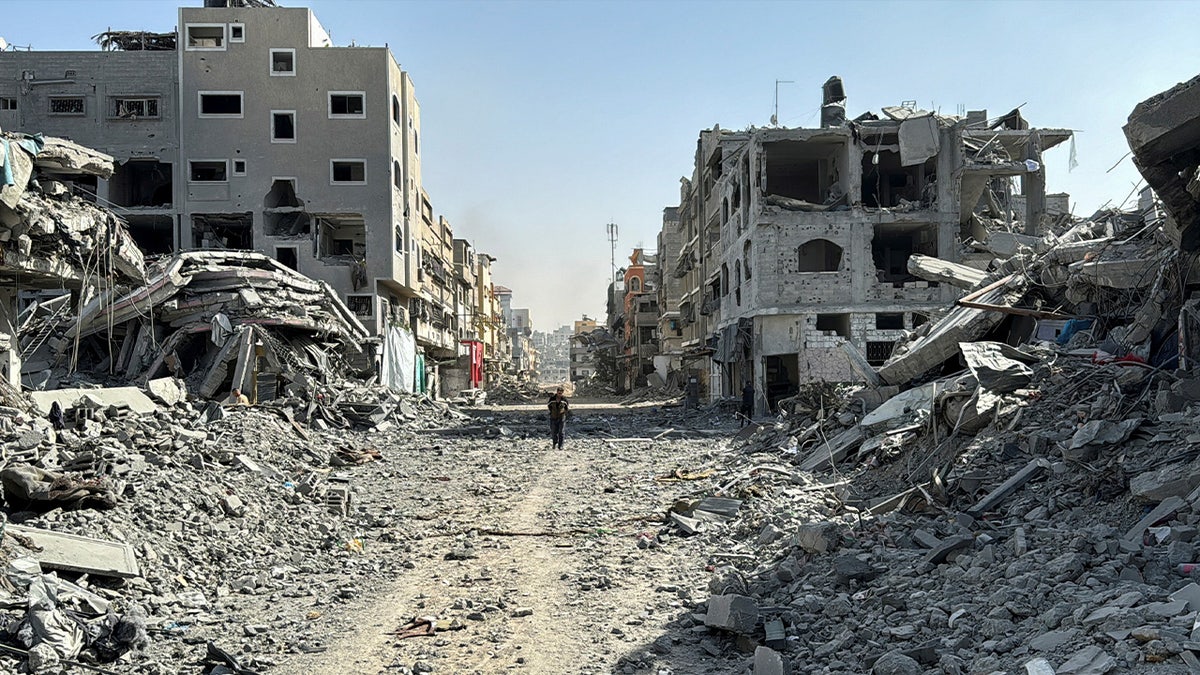
A man walks past the rubble after Israeli forces withdrew from the area around Kamal Adwan hospital, amid the ongoing Israel-Hamas conflict in Jabalia in the northern Gaza Strip on Oct. 26, 2024. (REUTERS/Stringer)
Goren admitted that aid quantities were low in October due to the High Holidays, memorials for the Oct. 7 anniversary, and the closing of the two Erez aid crossings for two weeks while troops moved into northern Gaza to battle “the heart of Hamas.” While many in the media supposed that the so-called “General’s plan” to evacuate northern Gaza and cut off aid was the culprit for diminished aid, Goren said that General’s plan has never “even been discussed in the army.” He also emphasized that “we are not in a war against civilians, but against Hamas.”
As a part of that war, COGAT ended private sector aid during the month of October. Goren said that Hamas was “trying to take advantage and use the private sector” as a way to collect taxes and steal aid. “So we closed it,” he explained. “There is no way that we will allow Hamas to empower itself from humanitarian assistance.”
TRUMP NAMES STEFANIK UN AMBASSADOR
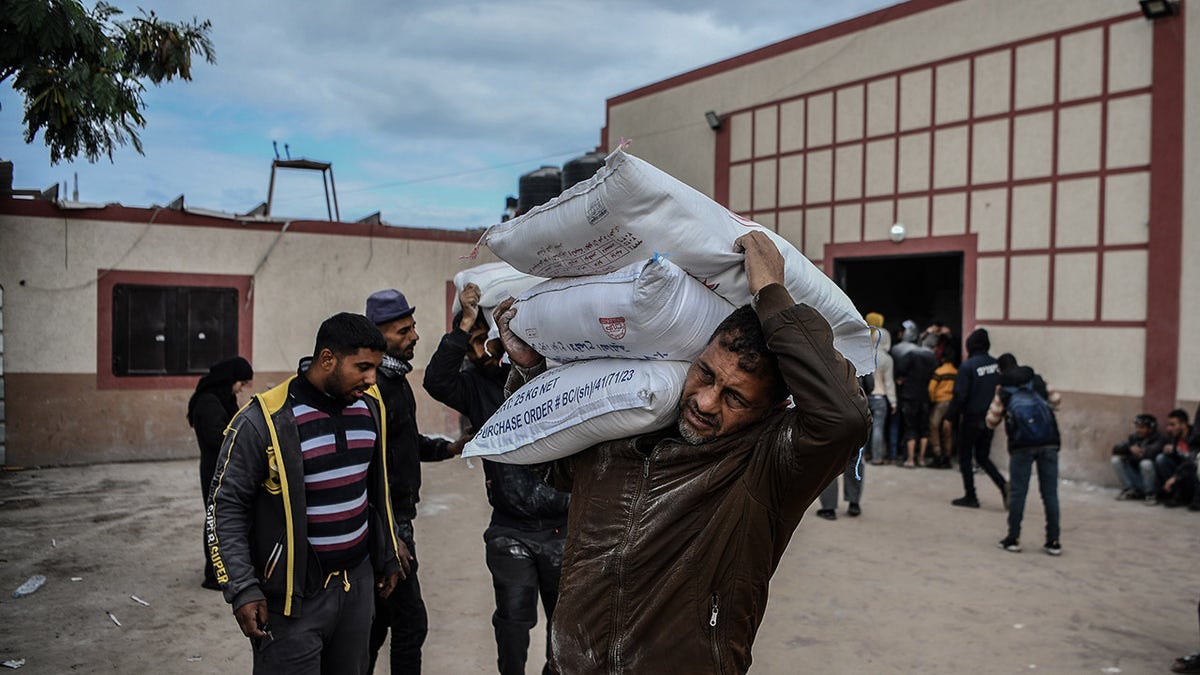
Palestinians, who left their homes and took refuge in Rafah city under hard conditions, carry the flour they received in the area where the United Nations Relief and Works Agency for Palestine Refugees distributes flour to families as Israeli attacks continue in Rafah of Gaza on Jan. 28, 2024. (Abed Zagout/Anadolu via Getty Images)
Secretary of State Antony Blinken stated on Oct. 16, 2023 that “if Hamas in any way blocks humanitarian assistance from reaching civilians, including by seizing the aid itself, we’ll be the first to condemn it, and we will work to prevent it from happening again.” President Biden emphasized two days later that “if Hamas diverts or steals the assistance, they will have demonstrated once again that they have no concern for the welfare of the Palestinian people and it will end.”
Fox News Digital asked the State Department whether Blinken would condemn Hamas’ aid theft and aid taxation, but received no response.
Adesnik told Fox News Digital that “from early on, at least last November or December, the administration has ramped up criticism of Israel, but with a couple of exceptions, continues to provide the weapons that Israel needs.” As Adesnik explained, “neither side thinks the U.S. is pursuing a principled middle ground.”
American officials’ frustration with Israel peaked last month, evidenced by a leaked letter from Secretary of State Antony Blinken and Secretary of Defense Lloyd Austin to Israeli officials on Oct. 13. In it, U.S. officials warned that they will need to reassess whether to allocate foreign military funds to Israel. They provided a list of improvements they expect to see before Nov. 13. This included enabling the delivery of 350 truckloads of aid each day, a benchmark not yet achieved.
On Tuesday, State Department spokesman Vedant Patel noted that Israel was currently not “in violation of U.S. law,” adding that, “We are watching these circumstances closely and we will, make appropriate changes, within our own policy, should we need to if we assess that their compliance with US law has changed.”
Following the State Department’s announcement, Israel’s Ambassador to the United Nations, Danny Danon, told Fox News Digital that he welcomed the news, noting that “We worked very hard in order to assist humanitarian needs in Gaza.” Danon said the environment in Gaza is challenging given how Hamas terrorists operate which includes hijacking aid trucks, he said.
World
Russia-Ukraine war: List of key events, day 992

As the war enters its 992nd day, these are the main developments.
Here is the situation on Wednesday, November 13:
Fighting
- Ukraine shot down 46 of 110 Russian drones launched overnight, the Ukrainian Air Force said. An additional 60 Russian drones were lost in Ukrainian airspace and two travelled towards Belarus. Russian forces also launched three missiles during the overnight attack, in addition to guided aerial bombs, the Air Force said.
- Russian air defence systems destroyed 13 Ukrainian drones overnight in regions bordering Ukraine, Russia’s Ministry of Defence said.
- North Korean troops have begun engaging in combat alongside Russian forces, the United States State Department said. Spokesperson Vedant Patel said that more than “10,000 DPRK [North Korean] soldiers have been sent to eastern Russia”, the vast majority to the Kursk region, where they have “begun engaging in combat operations with Russian forces”.
International affairs
- Russia’s growing economic and military cooperation with China, North Korea and Iran “is not only threatening Europe”, it is also “threatening peace and security” in the Asia Pacific and North America, according to NATO Secretary-General Mark Rutte.
- Russian Security Council Secretary Sergei Shoigu has told China’s Minister of Foreign Affairs Wang Yi in Beijing that strong relations between Moscow and Beijing are a stabilising influence on the world.
- US Secretary of State Antony Blinken travelled to Brussels to discuss support for Ukraine in meetings with NATO and European Union counterparts, the State Department said.
- Ukraine is close to setting up three new joint ventures with European weapons producers to boost arms output, according to Ukraine’s First Deputy Prime Minister and Minister of Economy Yulia Svyrydenko. She said five joint ventures had already been set up with Western weapons producers, including German and Lithuanian companies.
- China needs to feel a “higher cost” for its support for Russia, which enables Moscow to pursue its war in Ukraine, Estonia’s ex-Prime Minister Kaja Kallas said at her confirmation hearing at the European Parliament to become the EU’s next foreign policy chief.
- The deputy chief of Russia’s Security Council and former Russian President Dmitry Medvedev accused European leaders of seeking to dangerously escalate the Ukraine conflict and push it “into an irreversible phase”, following the re-election of former US President Donald Trump.
- Massachusetts Air National Guard member Jack Teixeira was sentenced to 15 years in prison for leaking highly classified US military documents to a group of gamers on the Discord messaging app. The leaks included information concerning the use of US equipment in Ukraine following Russia’s 2022 invasion.
Russian affairs
- Russia’s estimates for this year’s grain harvest, as well as for the winter grain seeded area, will include data from Ukrainian territories under Moscow’s control, Russia’s Ministry of Agriculture said. Following months of bad weather, the ministry forecasts this year’s grain harvest at 130 million tonnes – a 12 percent decrease from 2023’s 148 million tonnes and an 18 percent reduction from the record 158 million tonnes in 2022.
- The city of Helsinki will initiate a forced takeover of the Finnish capital’s biggest sport and events stadium, the Helsinki Arena, from its sanctions-hit Russian owners, the city’s executive governing board said.
- A Russian Navy frigate equipped with new-generation hypersonic cruise missiles conducted drills in the English Channel and is carrying out tasks in the Atlantic Ocean, Russian media reported.
- Russia’s lower house of parliament unanimously voted to ban “propaganda” promoting a child-free way of life, as it hopes to boost the faltering birthrate while death rates are up due to Moscow’s war in Ukraine.
- A Russian court sentenced a Moscow paediatrician to five and a half years in a penal colony after the mother of one of her patients publicly denounced her over negative comments she allegedly made about Russia’s war in Ukraine.
-

 Culture1 week ago
Culture1 week agoTry This Quiz on Books That Were Made Into Great Space Movies
-

 Health5 days ago
Health5 days agoLose Weight Without the Gym? Try These Easy Lifestyle Hacks
-

 Culture5 days ago
Culture5 days agoThe NFL is heading to Germany – and the country has fallen for American football
-

 Business4 days ago
Business4 days agoRef needs glasses? Not anymore. Lasik company offers free procedures for referees
-
/cdn.vox-cdn.com/uploads/chorus_asset/file/25538361/247196_Echo_Spot_Review_8A0A1511_CVirginia.jpg)
/cdn.vox-cdn.com/uploads/chorus_asset/file/25538361/247196_Echo_Spot_Review_8A0A1511_CVirginia.jpg) Technology1 week ago
Technology1 week agoAmazon’s Echo Spot alarm clock is on sale with a free color smart bulb
-

 Sports4 days ago
Sports4 days agoAll-Free-Agent Team: Closers and corner outfielders aplenty, harder to fill up the middle
-

 News2 days ago
News2 days agoHerbert Smith Freehills to merge with US-based law firm Kramer Levin
-
/cdn.vox-cdn.com/uploads/chorus_asset/file/25724877/Super_Nintendo_World.png)
/cdn.vox-cdn.com/uploads/chorus_asset/file/25724877/Super_Nintendo_World.png) Technology2 days ago
Technology2 days agoThe next Nintendo Direct is all about Super Nintendo World’s Donkey Kong Country
